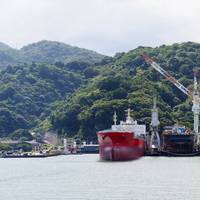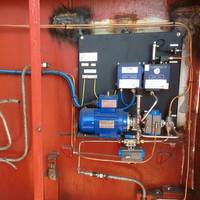US Coast Guard: Latvia Records Highest Detention Ratio in 2022

The US Coast Guard’s Office of Commercial Vessel Compliance has released its U.S. Port State Control Annual Report for 2022, with Latvia noted as having the highest detention ratio, ahead of Bolivia.The report lists highest risk flag administrations based on their 2020-2022 detention ratio as: Latvia (57.14%), Bolivia (31.25%), Togo (7.69%), Curacao (4.88%), Italy (3.39%), Turkey (2.90%) and Saint Vincent and the Grenadines (2.30%).Medium risk flag administrations were Cyprus…
ClassNK Amends Class Rules

Classification society ClassNK has released amendments to its Rules and Guidance for the Survey and Construction of Steel Ships.The 48 amendments were issued on 3June 30, including the following items:Regarding “Oil-lubricated Propeller Shafts Kind 1”, the notation requirements to affix “1C” to the classification characters of the ships fitted with oil-lubricated propeller shafts (Kind 1C), which have a reputation for being highly reliable by various means not only to prevent corrosion damage to stern tube bearings but also to facilitate general maintenance and management more easily…
Tanker Operator, Master Sentenced for Pollution
A tanker vessel operator and master were convicted this week for maintaining false and incomplete records relating to the discharge of oil and garbage from an oil tanker that was operating off the coast of Texas. On Monday, operator Sea World Management & Trading Inc. and the master of tanker Sea Faith, Edmon Fajardo, pleaded guilty to two felony violations of the Act to Prevent Pollution from Ships for failing to accurately maintain the Sea Faith’s Oil Record Book and Garbage Record Book, announced U.S. Attorney Ryan K. Patrick and Acting Assistant Attorney General Jeffrey H. Wood. Both admitted that oil cargo residues and machinery…
Biofuels: Time Running Out for Tanker Owners

New regulations on the carriage of biofuels could limit the trading flexibility of product tankers from next January, according to Rivertrace Engineering, Managing Director, Mike Coomber. This is because oil discharge monitoring equipment on board most existing vessels is not geared up to handle biofuels. From next January, Coomber warns that vessels without up-to-date type-approved equipment will not even make it on to charterers’ shortlists because they will no longer be eligible to carry biofuel cargoes. The regulations are embodied in IMO Resolution MEPC.108(49) as amended by MEPC.240(65).
New Carriage Requirements for Petroleum Blends

2. chemical tankers intending to carry biofuel blends of gasoline and ethyl alcohol cargoes containing more than 1% but less than 75% of petroleum oil to use alcohol-resistant foam or multi-purpose foam concentrates in their cargo deck fire-fighting systems. Resolution MEPC.240(65) requires oil tankers that are carrying biofuel blended cargoes containing 75% or more of petroleum oil on or after the January 1, 2016, and are fitted with an ODM system (Marpol Annex I, Regulation 31), to have the system approved and tested for the individual biofuel blend.
LR Statutory Alert: Bio-Fuels
Statutory alert: Changes to the requirements for the carriage of blends of petroleum oil and bio-fuels. The 62nd session of the IMO Marine Environment Protection Committee (MEPC 62) agreed that from September 1, 2011, bio-fuel/petroleum oil blends should be carried in accordance with new Guidelines for the Carriage of Blends of Petroleum Oil and Bio-fuel. These are contained in IMO Circular MEPC.1/Circ.761. The Guidelines define bio-fuels as: ethyl alcohol (ethanol), fatty acid methyl esters (FAME), vegetable oils (triglycerides) and alkanes (C10-26), linear and branched with flashpoint of either 60ºC or less or more than 60ºC. Further bio-fuels identified as falling under the scope of the Guidelines will be listed in a new Annex 11 of the MEPC.2/Circular.
Coast Guard Expels Ship from Port Canaveral
The U.S. Coast Guard Captain of the Port expelled a vessel from Port Canaveral after Coast Guard marine inspectors found the vessel in violation of many serious safety standards. The Aral Wind is a 500-ft., gasoline tanker that was preparing to unload its cargo at the South Cargo Piers - Tanker Berth 1 when inspectors from Coast Guard Marine Safety Detachment Port Canaveral met the vessel to conduct a routine certificate of compliance boarding. The vessel did not have a valid certificate of compliance, and the conditions on the ship were so unsafe inspectors left the vessel shortly after beginning their inspection. Coast Guard inspectors found that high-level gas alarms in the vessel's cargo hold were disabled.





